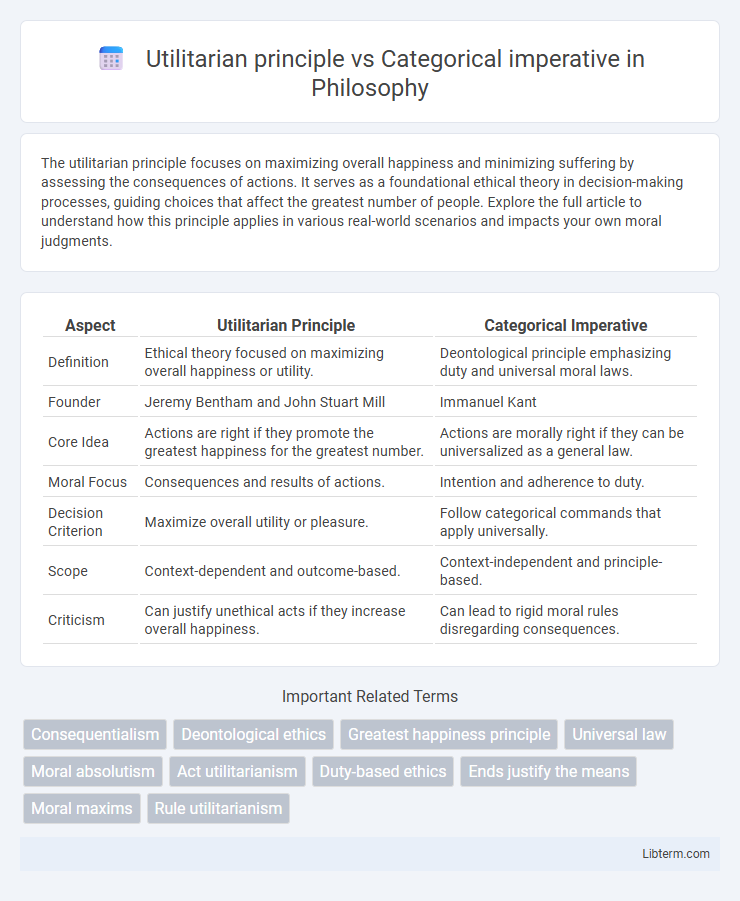The utilitarian principle focuses on maximizing overall happiness and minimizing suffering by assessing the consequences of actions. It serves as a foundational ethical theory in decision-making processes, guiding choices that affect the greatest number of people. Explore the full article to understand how this principle applies in various real-world scenarios and impacts your own moral judgments.
Table of Comparison
| Aspect | Utilitarian Principle | Categorical Imperative |
|---|---|---|
| Definition | Ethical theory focused on maximizing overall happiness or utility. | Deontological principle emphasizing duty and universal moral laws. |
| Founder | Jeremy Bentham and John Stuart Mill | Immanuel Kant |
| Core Idea | Actions are right if they promote the greatest happiness for the greatest number. | Actions are morally right if they can be universalized as a general law. |
| Moral Focus | Consequences and results of actions. | Intention and adherence to duty. |
| Decision Criterion | Maximize overall utility or pleasure. | Follow categorical commands that apply universally. |
| Scope | Context-dependent and outcome-based. | Context-independent and principle-based. |
| Criticism | Can justify unethical acts if they increase overall happiness. | Can lead to rigid moral rules disregarding consequences. |
Introduction to Ethical Theories
Utilitarian principle evaluates actions based on their consequences, aiming to maximize overall happiness or utility for the greatest number of people. Categorical imperative, rooted in Kantian ethics, emphasizes duty and moral rules that apply universally, irrespective of outcomes. These foundational ethical theories provide contrasting frameworks for decision-making, with utilitarianism focusing on results and the categorical imperative prioritizing inherent moral duties.
Understanding the Utilitarian Principle
The Utilitarian principle evaluates actions based on their consequences, aiming to maximize overall happiness or utility for the greatest number of people. It relies on a cost-benefit analysis to determine the ethical choice by quantifying pleasure and pain resulting from an action. This principle contrasts with Kant's Categorical Imperative, which emphasizes duty and universal moral laws independent of outcomes.
Exploring the Categorical Imperative
The Categorical Imperative, formulated by Immanuel Kant, mandates actions that can be universally applied without contradiction, emphasizing duty and moral law over consequences. Unlike the Utilitarian principle, which evaluates morality based on the greatest good for the greatest number, the Categorical Imperative demands adherence to maxims that respect human dignity and autonomy inherently. This principle anchors ethical decision-making in rational consistency and respect for persons as ends in themselves.
Core Philosophical Differences
The utilitarian principle evaluates actions based on their consequences, aiming to maximize overall happiness or utility, whereas the categorical imperative, formulated by Immanuel Kant, dictates that actions must be morally permissible regardless of outcomes, guided by universalizable maxims. Utilitarianism embraces a consequentialist ethical framework focused on the greatest good for the greatest number, while Kantian ethics adheres to deontological principles prioritizing duty and adherence to moral law. These core philosophical differences reflect distinct approaches to moral decision-making: outcome-based evaluation versus intrinsic moral obligations.
Application in Real-World Scenarios
The Utilitarian principle guides decision-making by maximizing overall happiness or utility, making it effective for policy-making, healthcare allocation, and cost-benefit analyses in ethics. The Categorical imperative, developed by Immanuel Kant, mandates actions based on universal moral laws, emphasizing duty and rights, which is critical in legal frameworks and human rights advocacy. Real-world scenarios such as business ethics and environmental regulations often balance these frameworks to ensure both practical outcomes and principled integrity.
Strengths of Utilitarianism
Utilitarianism's strength lies in its clear focus on maximizing overall happiness and well-being, providing a pragmatic framework for ethical decision-making based on outcomes. This principle values the greatest good for the greatest number, allowing for flexible and context-sensitive moral judgments that adapt to varying circumstances. Its consequentialist nature promotes social welfare by emphasizing the tangible benefits of actions, making it highly applicable in public policy and resource allocation.
Strengths of the Categorical Imperative
The Categorical Imperative offers a clear, universal moral framework based on duty and rationality, ensuring consistency and fairness in ethical decision-making. It emphasizes actions that can be universally applied, promoting respect for individuals as ends in themselves rather than means to an end. This principle prevents subjective biases and promotes intrinsic moral values, distinguishing it from the outcome-based Utilitarian approach.
Criticisms and Limitations
The Utilitarian principle faces criticism for potentially justifying morally questionable actions if they maximize overall happiness, ignoring individual rights and justice. The Categorical Imperative is criticized for its rigidity and inability to account for context or consequences, which can lead to conflicting moral duties. Both approaches struggle with practical application, where utilitarianism often demands exhaustive calculations and Kantian ethics may result in overly strict rules that lack flexibility.
Contemporary Relevance and Debates
The Utilitarian principle, emphasizing the greatest happiness for the greatest number, remains central in contemporary policy-making, especially in public health and economic decisions where outcomes are quantifiable. The Categorical Imperative, formulated by Immanuel Kant, persists in debates on human rights and ethical duties, underscoring actions that respect individuals as ends in themselves regardless of consequences. Current discussions hinge on balancing utilitarian calculations with Kantian ethics to address issues like AI ethics, climate change policies, and bioethics, reflecting tensions between consequentialist pragmatism and deontological moral absolutes.
Conclusion: Implications for Moral Decision-Making
The utilitarian principle prioritizes outcomes by maximizing overall happiness, emphasizing consequences in moral decision-making, while the categorical imperative demands adherence to universal moral duties regardless of results. This divergence influences ethical judgments, with utilitarianism justifying actions based on their beneficial impact and Kantian ethics upholding intrinsic moral laws. Understanding these frameworks shapes approaches to ethical dilemmas, highlighting whether decisions should focus on practical benefits or unwavering moral obligations.
Utilitarian principle Infographic

 libterm.com
libterm.com